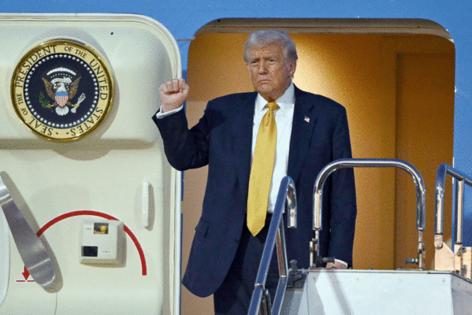Here are the key US-China issues to watch in Trump-Xi summit
Published in News & Features
A meeting Thursday between Presidents Donald Trump and Xi Jinping is set to be one of the key diplomatic events of the year, with the U.S.-China economic relationship at stake following multiple rounds of escalating tensions and temporary truces.
Trump told traveling reporters Monday on Air Force One that while nothing has yet been agreed, he felt good going into the meeting with Xi set to take place on the sidelines of the Asia-Pacific Economic Cooperation summit in South Korea.
U.S. Treasury Secretary Scott Bessent, speaking in the same briefing, said a framework for Trump and Xi to finalize was forged over weekend talks with China, whose delegation was headed by Vice Premier He Lifeng.
The following are among the top issues the two sides have been haggling over:
Rare Earths
China’s curbs on exports of rare earths — a critical component in industrial supply chains, the processing of which is dominated by Chinese firms — has been a key pain point for the U.S. this year. The Trump administration has sought to roll back more sweeping controls Beijing announced on Oct. 9, which were set to be implemented in December. Those require overseas firms to get Beijing’s approval for shipments of goods with even trace amounts of certain Chinese rare earths.
Bessent said Sunday he believed China would delay its latest rare-earth restrictions “for a year while they reexamine” the move.
Export controls
The U.S. has expanded its own export curbs this year, with Beijing in particular calling out a Sept. 29 move to vastly expand controls on the sale of semiconductor gear to subsidiaries of Chinese companies already on Washington’s so-called entity list. That step could affect thousands of China-linked enterprises around the world.
Bessent has said the framework he negotiated doesn’t involve the U.S. rolling back its controls, though analysts suspect this indeed will be an area where China wins a quid-pro-quo concession.
Fentanyl supply
Trump earlier this year slapped a 20% import surtax on Chinese goods over what he alleged was a failure by Beijing to curb exports of the drug fentanyl and its precursors. China’s Vice Commerce Minister Li Chenggang said over the weekend that a preliminary consensus had been reached on fentanyl, without offering details, raising the prospect of tariff relief.
TikTok
The U.S. and China are finalizing a deal to spin off the U.S. operations of social media platform TikTok from its Beijing-based owner ByteDance Ltd. following talks in Madrid in September.
Trump signed an executive order Sept. 25 saying TikTok U.S. will be majority-owned and controlled by Americans. And the owners will lease a copy of the algorithm from ByteDance that Oracle will then retrain. But there’s been no official information that Beijing has approved the deal. Trump said he’s going to talk about the issue with Xi, and may sign a final deal on Thursday.
Shipping levies
China began to collect special port fees on U.S.-owned and built vessels on Oct. 14, the same day Washington imposed charges on large Chinese ships calling at U.S. ports. Beijing also sanctioned the U.S. units of a South Korean shipping giant for assisting investigative activities of the U.S. government.
Chinese trade envoy Li said the two countries will address the levies, suggesting an agreement has been reached following the weekend talks.
Soybean trade
Beijing has also been using agriculture as leverage in trade talks, withholding purchases of U.S. soybeans since the start of this harvest season — something that’s left American farmers struggling with financial stress. Bessent said China is expected to make “substantial” purchases of U.S. soybeans, though China’s official readout mentioned agricultural products as an area where “preliminary consensus” was reached.
Additional tariffs
China currently faces a 55% surtax on its exports to America, in the wake of the Trump administration’s ramp-up of levies in April. The U.S. threatened to put an additional 100% tariff on Chinese goods starting Nov. 1, following Beijing’s new rare earth curbs. After the talks in Kuala Lumpur, Bessent said in an interview with CBS News the newly threatened levy “is effectively off the table.”
Another deadline looms Nov. 10. That’s when the latest 90-day truce on even higher U.S. duties — as much as 145% — is set to expire. Bessent has indicated that at some point the pause on that level of tariffs could be extended beyond the 90-day period seen in recent rounds.
The Trump administration has also in recent days launched a probe into whether China complied with the limited trade agreement reached in 2020, during Trump’s first term. The move could potentially open door to new tariffs. But Trump on Monday suggested he may drop the investigation altogether based on his upcoming talks with Xi.
Russia war
While China and the U.S. have so far largely limited their talks to economic issues, Bessent has indicated that when the two leaders meet, they’re also going to discuss a global peace plan — after Trump said publicly he hoped to enlist Xi’s help in resolving Russia’s war in Ukraine.
Xi and Russian President Vladimir Putin have pushed their nations closer together since Moscow’s full invasion of Ukraine in early 2022, with China providing economic and diplomatic backing for its neighbor.
©2025 Bloomberg L.P. Visit bloomberg.com. Distributed by Tribune Content Agency, LLC.







Comments